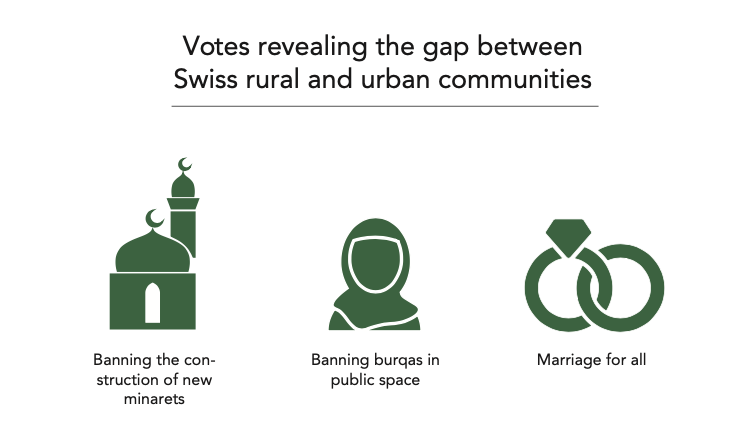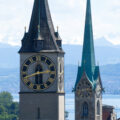Awareness of normativity as a tool for dialogue
Awareness of normativity as a tool for dialogue
Normativity was a building block for Switzerland’s founding community. Yet, how do Swiss people consider their norms today?
This article is part of our series on normativity in Europe.
Switzerland built on different identities
In 1291, three rural communities signed a protection agreement with each other. Uri, Schwyz, and Unterwald are the first three cantons forming Switzerland. In 1815, Switzerland became the Confederation of 22 cantons as we know it today. The first cantons of Switzerland were German speaking, and when Bern became part of the Confederation, French- and Italian-speaking communities allied with these cantons.[1]
Each canton came into the alliance with its own confessional, social, and ethical norms. The confessional norms in the canton of St-Gallen were Catholic while they were Protestant in the cantons of Zurich and Geneva. In Geneva, for example, Calvin instituted moral rules such as the sense of modesty in clothing.[2] These norms, present in the Confederation, show that normativity was a building block for Switzerland’s founding community. Yet, how do Swiss people consider their norms today? Is the Swiss norm often taken into account in political and ethical debates?
Normativity as a source of ethical debates
One recent event portrays the importance of norms in Swiss society and the discussions that surround them. In September 2020, there was a controversy in a middle school in Geneva. The middle school asked that two boys and ten girls wear a white XXL t-shirt provided by the school because their outfit was inappropriate. One girl was wearing high-waisted jeans with a white pullover which revealed her stomach slightly. The mother of this girl filed a complaint because, according to her, her daughter was wearing an appropriate outfit. The t-shirt provided by the school featured the symbol of a Facebook ‘like’ on it, in addition to the text ‘an appropriate outfit’.[3]
Following this event, it was revealed that other similar situations had occurred in other middle schools in French-speaking cantons. Many discussions followed this event, with a major focus of discussions being about the continued sexualisation of women’s bodies. Debates about women’s clothing are recurrent in Switzerland and mostly in Geneva, as it became a social norm. When Calvin reformed Geneva, he established many rules and morals to make better Christians out of the citizens of Geneva.[4] These rules are not used anymore, but still shape social norms today. The main one is the norm of modesty in social contexts through clothing and ways of being. However, the example of the t-shirt in the middle school reveals how this norm of modesty disagrees with the freedom of expression of young girls today. Because of a religious norm, individuals are limited in their freedom of expression. Therefore, how can the awareness of our religious norms become relevant for freedom of expression?
Academia in Switzerland offers tools for awareness of normativity
In Switzerland, the faculties of theology are Catholic or Protestant according to their locations. For example, The Chur School of Theology teaches about Catholic confession as Chur is the oldest city in Switzerland and became Catholic in the 4th century.[5] Therefore, the faculties assume part of their historical identity by teaching about the confession that historically formed the canton. However, the tendency to affirm a confessional identity in a faculty is largely discussed. The majority of these faculties propose a program in the first year that is focused on learning the theology of the specific confession. Then the program invites students to learn about other religions by going into History of Religions classes.[6] These bachelor programs depict the debate of normativity in Swiss academia. In the field of religion, students are made aware of their religious and cultural norms, and are taught how to use these norms for a dialogue with other confessions or religions. So can this identity policy, in the field of religion, truly help in the matter of freedom of expression?
How norms influence freedom of religion in Switzerland
In Swiss law, freedom of religion is clearly stated. But in reality, this freedom is not present in all situations. Two past votes revealed the gap between rural and urban communities in Switzerland. In 2010, all Swiss citizens had to vote on the possibility of building minarets in Switzerland. The law on banning the construction of new minarets passed with a small majority of people from German-speaking rural communities.[7] The same event happened in 2020 with the vote on banning the wearing of burqas in public space.[8] In September 2021, the Swiss population will vote on the matter of ‘marriage for all’.[9] But will a religious norm, which later became a Swiss cultural norm, once again not permit freedom of religion?

Awareness of normativity for freedom of expression
These examples show how a few cultural norms that originate from the 16th-century theological discourse in Switzerland are still impacting Swiss society in the present day. An attachment to some Christian moral values and the practice of modesty influence daily decisions in Switzerland and seem to contradict freedom of expression.
However, if used differently, these norms have the potential to harmonise freedom of religion with freedom of expression. These events happened due to a lack of awareness of the different religious norms that were included in the debate. In the case of the vote on minarets and the burqa, rural communities are not often in dialogue with people of other religions.[10] Thus, they are not aware of Swiss Muslims’ cultural norms. Moreover, the t-shirt incident shows that the representatives of education in Geneva are often not aware that their cultural norm comes from Calvin’s time. In Switzerland, theological faculties have grasped this issue of misuse of normativity. Thus, they try to teach about these norms in order to produce a fruitful dialogue with other religions.[11]
These religious norms, which later became social norms, are significant for dialogue as they portray the identity of the people in dialogue. Freedom of religion starts with becoming aware of norms present in different religions. Freedom of expression would also be more respected through this awareness, as freedom of religion and freedom of expression are interconnected due to this historical shift from religious norms to social norms. In conclusion, our awareness of our normativity can be used as a tool for dialogue to harmonise freedom of religion with freedom of expression in Switzerland.
Our team of analysts conducts research on topics relating to religion and society. In the second half of 2021, we are focusing on the subject of normativity. Find out more on the EARS Dashboard.
Sources
[2] Calvin, ordonnance sur les moeurs
[3] Un t-shirt de la honte crée polémique dans un cycle genevois
[4] Calvin, théocratie dictature d’une bourgeoisie immature
[6] UniGe enseignements,UniBas Programs,ThChur Bachelor and UniL formations
[7] Minaret, un vote qui alimente les méfiances
[8] Après les minarets, la Suiss banni aussi la Burqa
[9] Objets de la votation populaire du 26 septembre 2021
[11] UniBe interreligious formation and Unifr interreligious formation






